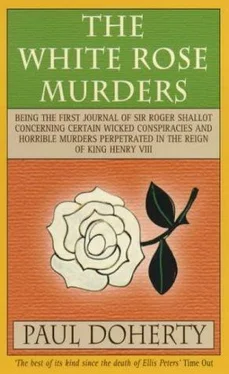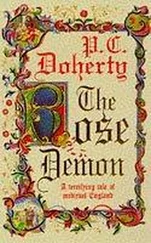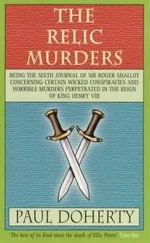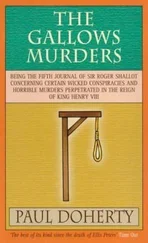Paul Doherty - The White Rose murders
Здесь есть возможность читать онлайн «Paul Doherty - The White Rose murders» весь текст электронной книги совершенно бесплатно (целиком полную версию без сокращений). В некоторых случаях можно слушать аудио, скачать через торрент в формате fb2 и присутствует краткое содержание. Жанр: Исторический детектив, на английском языке. Описание произведения, (предисловие) а так же отзывы посетителей доступны на портале библиотеки ЛибКат.
- Название:The White Rose murders
- Автор:
- Жанр:
- Год:неизвестен
- ISBN:нет данных
- Рейтинг книги:4 / 5. Голосов: 1
-
Избранное:Добавить в избранное
- Отзывы:
-
Ваша оценка:
- 80
- 1
- 2
- 3
- 4
- 5
The White Rose murders: краткое содержание, описание и аннотация
Предлагаем к чтению аннотацию, описание, краткое содержание или предисловие (зависит от того, что написал сам автор книги «The White Rose murders»). Если вы не нашли необходимую информацию о книге — напишите в комментариях, мы постараемся отыскать её.
The White Rose murders — читать онлайн бесплатно полную книгу (весь текст) целиком
Ниже представлен текст книги, разбитый по страницам. Система сохранения места последней прочитанной страницы, позволяет с удобством читать онлайн бесплатно книгу «The White Rose murders», без необходимости каждый раз заново искать на чём Вы остановились. Поставьте закладку, и сможете в любой момент перейти на страницу, на которой закончили чтение.
Интервал:
Закладка:
'Many people come here,' he replied quietly in perfect English. 'They bring gifts and treasures which they commit to our care. Some return, some do not.' He spread his hands. 'They place their trust in us.' He looked sharply at Benjamin. 'You swear that Selkirk is dead?'
'I do, Father Prior.'
'And his secret is one which may threaten the English throne?'
'Perhaps,' Benjamin replied. 'But it has been responsible for the deaths of at least three good men and may cause the deaths of others, including our own.'
The prior moved uneasily behind his desk. He pointed to the Bible chained to a great lectern beside him. 'Swear that!' he rasped. 'Swear what you say is true, with your hand on the Gospels!'
Benjamin obeyed. One hand placed on the great, jewel-embossed cover and the other held high, he proclaimed in solemn tones that God be his witness, what he said was the truth. Once he had finished the prior nodded and his granite face broke into a thin smile. He rang a small hand bell. A young monk entered to whom the prior whispered hoarse instructions. I heard the name 'Selkirk' and a possible date. The young monk nodded and padded softly away, returning soon afterwards with a small, battered leather coffer sealed with the waxen crest of the Abbey of St Denis. The prior broke this and lifted the lid. He felt around inside, his long fingers picking up scraps of parchment. He looked despairingly at Benjamin.
'You say Selkirk was mad?' 'Yes, Father Prior.'
'Then this may be his last insane joke. There's nothing here but innumerable scraps of parchment. Now my conscience is settled, you may take it.'
We left St Denis as darkness fell and made our way to a tavern outside one of the gateways of Paris on the main road to Calais, a warm comfortable place which had escaped the ravages of famine which still afflicted the city. Benjamin hired a chamber as well as fresh horses for the morning. He also ordered a meal of succulent roast capon cooked in rich sauces and freshly baked loaves of pure wheat rather than the coarse rye bread I had eaten the previous months. I gorged myself to the gills although Benjamin ordered me to be temperate with the wine. Afterwards, we sat in the ingle-nook of the great fireplace watching the roaring flames turn the pine logs to a white smouldering ash. Benjamin opened Selkirk's casket and for a while sifted amongst the pieces of parchment. One was singular: a dirty yellow piece, jagged at the top and bottom; only the heading was discernible, a quotation in Latin from one of St Paul's epistles. It simply said: 'Through a glass darkly'. The rest were a jumble of hieroglyphics and strange signs. There were some complete manuscripts but these were nothing more than a collection of royal warrants written personally by King James and sealed under his signet ring, granting tasks or favours to his 'beloved physician, Andrew Selkirk'. Benjamin studied some of these and so did I but we could discover nothing amiss. My master placed the documents back in the casket.
'Let us refresh our memories,' he said. 'Selkirk was King James's physician. He went with the King to Flodden where James was defeated and killed. Selkirk fled to Paris, left his so-called secret at St Denis and went to Le Coq d'Or where he was arrested and taken to England.' He stared at me. 'You would agree with that?'
'Yes, Master.'
'Now, in Scotland, James's widow Margaret, the mother of one infant, is pregnant again when she hears the news of her husband's defeat and death. By King James's will, she is made Regent but forfeits that position by marrying the Earl of Angus. She also loses the confidence of her nobles and is forced to flee to England, leaving her two boys behind. The Scottish nobles set up a Regency Council with control of Margaret's baby sons, one of whom, Alexander, Duke of Ross, dies soon after his mother's sudden departure for England. Am I correct Roger?'
'A number of matters,' I replied, 'must also be remembered. First, before James went to Flodden, he had so-called visions which warned him against his loose morals and of the dangers of invading England. Secondly, why should Margaret suddenly marry the Earl of Angus and then, within such a short time, desert him; indeed, even hate him? Thirdly, why did she shelter in England away from her kingdom and her sons? We heard from the Lord d'Aubigny that the Scottish Council is more than prepared to welcome Queen Margaret back with open arms.'
'Which,' Benjamin continued, 'leads us to this sudden change in the Queen's mood. It seems that she cannot return to Scotland fast enough. I'm sorry. Go on, Roger.'
'I wonder what Margaret was so frightened of? And what secrets she and the Earl of Angus share? Don't forget, Master, there are other mysteries which may be contained in the documents in that casket. What did Selkirk mean by the phrase he could "count the days"? And why has King James's body not been returned to Scotland for burial?'
Benjamin nodded and stared at the dying flames of the fire.
'Which brings us to Selkirk's verses,' he said. 'We know the falcon is James, the lamb is Angus, the Lion also is the King of Scotland. Is Selkirk saying that somehow King James survived Flodden? Something we suspected when we viewed the corpse at Sheen.'
'Perhaps,' I interrupted. 'The verses do say the Lion cried even though it died. Finally, we have discovered who Dionysius was but not the real secret left with him.'
Benjamin picked up the casket and carefully examined the lining, searching for any secret compartment or hidden drawer.
'Nothing,' he murmured.
'Which brings us, Master,' I said, 'to the murders once more. Both Selkirk and Ruthven were found poisoned in chambers locked from the inside. No poisoned cup or dish was found there.'
Benjamin agreed.
'Whilst Irvine,' he remarked, 'could have had his throat cut by any member of Queen Margaret's household except for four; you and I who were at the convent, and Catesby and Melford who were in Nottingham. We also know that the Queen herself did not leave the manor house.'
'Which means,' I concluded wearily, 'that we do not know who the murderer really is, although we suspect Moodie. We do not know Selkirk's secret, even though we hold it in our hands. Above all, we do not know the meaning of the first two lines of his damnable poem, "Three less than twelve should it be, Or the King, no prince engendered he!" '
On that merry note we both retired for the night. Benjamin spent most of the time sitting in a chair staring at the guttering candle flame, whilst my sleep was racked by terrible nightmares of my visit to Montfaucon. The next morning Benjamin dressed my wounds and we began our journey back to Calais. The weather improved and, although the roads were clogged with icy mud, we soon reached the Channel port where Benjamin used his warrants and his status to secure our passage home on a man-o'-war.
A terrible journey, believe me! If Hell exists, it must consist of being eternally sick on a ship which crosses the Narrow Seas but never reaches shore. I disembarked at Dover, cursing Benjamin, the King, the Lord Cardinal, and heartily wishing I was back in Ipswich, free from the baleful influence of the Great Ones of the soil. Matters were not helped when we found Doctor Agrippa waiting for us in a seaside tavern, cheerful and full of life as a well-fed sparrow. The fellow never seemed to age, nothing changed him; no lines of worry on his cherubic face, while those hard, glassy eyes shimmered with a quiet amusement.
He greeted us effusively, clasping Benjamin warmly by the hand. He insisted we join him for dinner where he regaled us with tidbits of gossip from the court and city.
'How did you know we were coming?' I asked crossly.
He smiled as if savouring some secret joke. 'I have my sources,' he quipped. 'The Lord Cardinal told me to come here. Your return was only a matter of time.' His face grew hard. 'You have news?'
Читать дальшеИнтервал:
Закладка:
Похожие книги на «The White Rose murders»
Представляем Вашему вниманию похожие книги на «The White Rose murders» списком для выбора. Мы отобрали схожую по названию и смыслу литературу в надежде предоставить читателям больше вариантов отыскать новые, интересные, ещё непрочитанные произведения.
Обсуждение, отзывы о книге «The White Rose murders» и просто собственные мнения читателей. Оставьте ваши комментарии, напишите, что Вы думаете о произведении, его смысле или главных героях. Укажите что конкретно понравилось, а что нет, и почему Вы так считаете.












